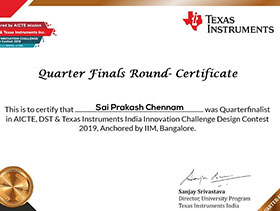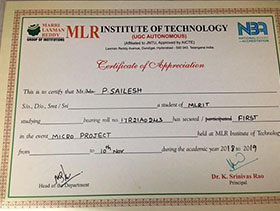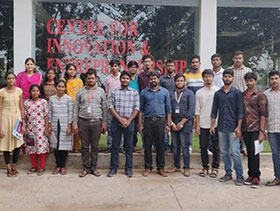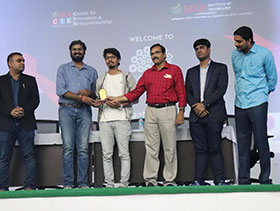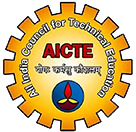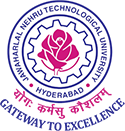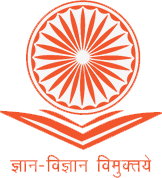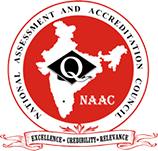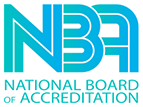Overview
Electrical and Electronics Engineering (EEE) is a field of engineering that generally deals with the study and application of electricity, electronics, and electromagnetism.The EEE department is established with state of art technical facilities to impart knowledge required for future educational and industrial needs. It has acoustic proof class rooms with audio-visual teaching aids. The departmental laboratories are furnished with latest equipment and instruments along with internet and computer systems. The department has well experienced faculties from reputed industries and institutions. It has well defined syllabus suited for needs of academic, industrial and research across the globe. The department is well integrated by standalone seminar hall and supporting auditorium to conduct seminars, workshops and training programs.

Vision
To impart the students with strong fundamental and applied knowledge to identify, analyze and research on upcoming energy related challenges that provide optimal solutions to the society and nation needs.

Mission
M1: Impart core and state-of-the-art knowledge in all domains of Electrical and Electronics Engineering.
M2: Foster the students learning to meet growing challenges through research and innovation.
M3: Imbibe entrepreneurial and leadership skills in order to develop eco-friendly energy technologies for nation and societal needs.
Program Educational Objectives
- PEO 1: Graduates will excel in the field of core engineering along with the supporting knowledge in mathematics, science and engineering fundamentals.
- PEO 2: Graduates have solid foundations in fundamentals is required to solve engineering problems through research and inculcate human values.
- PEO 3: Graduates will exhibit the effective skills in core design sectors, management and leadership at the national and multinational organizations.
- PEO 4: To provide a passionate academic environment for students that encourage learning of emerging technologies, multi-disciplinary areas.

Faculty Profiles

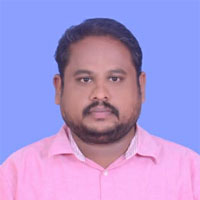
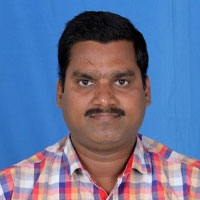
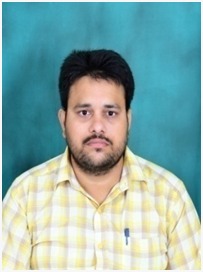
Internships
| S.NO | REG.NO | NAME | YEAR/SEM | ORGANIZATION | DURATION | STATUS |
|---|---|---|---|---|---|---|
| 1 | 17R21A0203 | A.Nikhitha | III/I | ITC Limited | 10 days | Completed |
| 2 | 17R21A0205 | B.Bhargav | II/II | BHEL | Completed | |
| 3 | 17R21A0208 | B.Bharathi | II/II | BHEL | Completed | |
| 4 | 17R21A0209 | B.Vani | II/II | BHEL | Completed |
Course Structure & Syllabus
Achievements
Publications
| S No | Faculty Name | Title of Paper | Journal | Year |
|---|---|---|---|---|
| 1 | Dr A.Sudhakar | Harmonic Minimization in direct torque controlled Induction Motor using Neural Network controller | International journal of Energy technology and policy - scopus indexed | 2020 |
| 2 | M.Srinivasa Reddy | MLR Institute of technology campus energy monitoring and controlling system with interconnection of grid and solar power | IJET,UAE,SCOPUS | Apr-20 |
| 3 | M.Srinivasa Reddy | "Mitigating Voltage Sag In Secondary Distribution Line Using DVR With Single DC Source " | INTERNATIONAL JOURNAL OF SCIENTIFIC & TECHNOLOGY RESEARCH VOLUME 9, ISSUE 03, MARCH 2020 | 2020 |
| 4 | M.Srinivasa Reddy | Review on energy consumption by using solar systems. | (IJPAM),Vol-120, N0.6, ISSN:1314-3395. | Oct-18 |
| 5 | M.Srinivasa Reddy | Design of sensors for adaptive solar panels. ARPN Journal of engineering and applied sciences. "ARPN Journal of engineering and applied sciences." | Vol-13, No.10,ISSN:1819-6608. | May-18 |
Computer Based Skills
- Inclusion of soft computing techniques as a professional elective course offered by EEE department under MLR 20 regulations to have awareness on artificial intelligence.
- Different computer coding based courses like Core java programming, Data analytics, Machine learning, Cloud computing, Big data.;etc . are offered as open electives to students of EEE Department to gain computer programming skills.
- Guidance for mini and micro projects for all the students to implement interdisciplinary concepts like IOT, smart technologies ,etc.
- Support to avail online internships on various computer coding platforms and continuous training will be provided through Campus Recruitment Training.
- Faculty expertise in artificial intelligence to guide the students in implementing AI controllers in various electrical engineering applications.
- Different short term training programs, hackathons on Artificial intelligence, Cyber security, Machine learning etc provided by Centre of Innovation and Entrepreneurship to enhance the students coding skills.

Department Achievements
MLR institute of technology, an autonomous, has set up a rooftop solar (RTS) photovoltaic plant of 260-kilowatt' (KWp) capacity. The move is expected to promote best practices of clean energy implementation in scientic institutions. The total plant capacity of 260 KWp has been connected to power grid provided by Telangana State Southern Power Distribution Company Limited (TSSPDCL). Established across two shadow-free building rooftops, it covers an approximate area of 780 Sq.m with 260 KWp of polycrystalline silicon solar panels. When connected to the grid, only the load that exceeds the plant capacity will be drawn from the Electricity Board, thus reducing the energy consumption.

